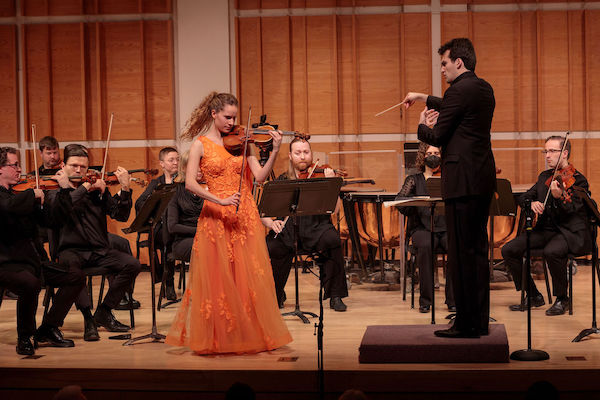Parlando brings the heat to music of the Cold War

Parlando, one of NYC’s most exciting chamber orchestras, presented a program in Merkin Hall on Sunday devoted to music from the Cold War era.
As is Parlando’s usual practice, in lieu of written program notes, founder and music director Ian Niederhoffer addressed commentary to the audience before each selection.
Aaron Copland’s Nonet for Strings was written in 1960. It is an exploratory work that combines elements from his lyric, populist style with new explorations in the 12-tone milieu. And while audiences of his day may have been unsettled by its chromaticism, the Nonet’s combination of learned, joyful and searching qualities are today quite appealing.
The Nonet deserves broader appreciation, and the kind of eloquent, engaged performances that Niederhoffer and his players gave it would undoubtedly bring this work many new friends.
Mieczyslaw Weinberg escaped the Holocaust in his native Poland by fleeing in the only direction open to him—east, to Moscow. As an educated Jewish foreigner, he came under severe and constant scrutiny from Stalin’s counter-intelligence machine.
Despite the harassing surveillance, Weinberg’s 1948 Concertino for Violin and String Orchestra is a varied, highly creative, energetic work that has an optimistic charm amid darker, somber episodes. Aubree Oliverson played the Concertino for all it is worth, capturing its varied moods with passion, fire, tenderness and sorrow. Her collaboration with Niederhoffer and the Parlando musicians was natural and dedicated.
Subsequently Oliverson treated the audience with a charming encore performance of Arches, a work for unaccompanied violin by contemporary American composer Kevin Puts. The work is essentially an exercise in arpeggiation, yet this approachable work in the virtuosic hands of Oliverson, was a joy to experience.
The second half of the concert was devoted to Edvard Mirzayan’s Symphony for Timpani and Strings, dating from 1962. An ethnic Armenian, Mirzayan was born in Turkey not long after the Armenian Massacre. As a child, he moved to the Soviet Union in the aftermath of a massive earthquake that destroyed his home town, an episode not dissimilar to the current geologic tragedy occurring in Turkey and Syria. After receiving thorough musical training under Soviet supervision, Mirzayan moved to Armenia, where his music was largely rejected as being devoid of Armenian elements. Mirzayen worked strenuously to recapture his cultural heritage, creating works that emphasized Armenian qualities.
One of his great triumphs was this Symphony. The work follows the traditional symphonic structure of four varied movements. Opening in a style that reflects elements of Armenian liturgical music, the Symphony progresses to a movement tied to folk melody, followed by a lament that Niederhoffer related to the Armenian Massacre, before arriving at a triumphant concluding movement.
Niederhoffer and his musicians gave a heartfelt, well-focussed performance of this engaging masterwork. Special praise goes to timpanist Andrew Beall for his brilliance, especially in the opening movement.
Parlando returns to Merkin Hall April 23 in a program featuring music by Ibert, Gorecki and Gulda. parlandonyc.com


